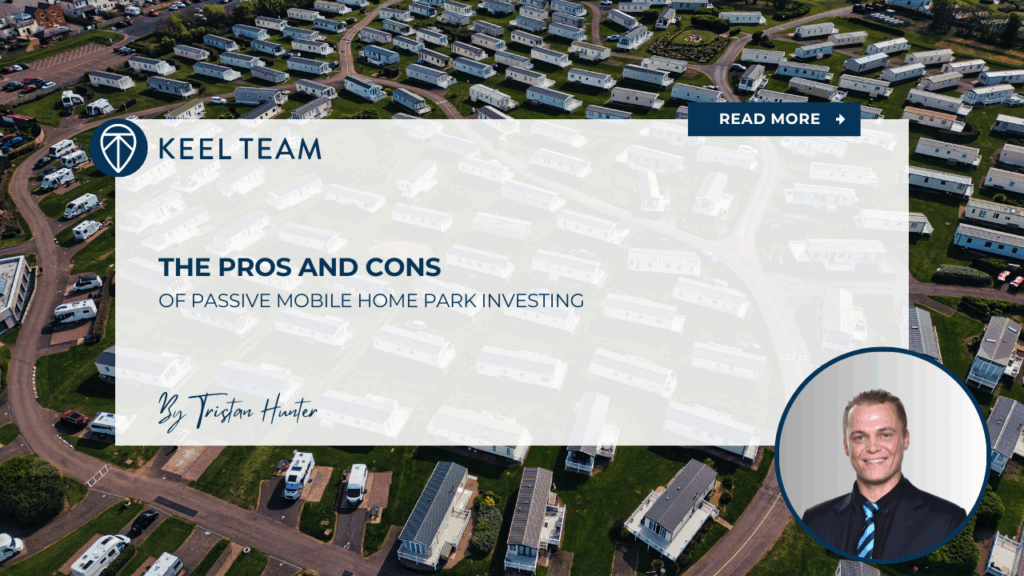The Pros and Cons of Passive Mobile Home Park Investing
-
 Tristan Hunter - Investor Relations
Tristan Hunter - Investor Relations

Mobile home park investing has emerged as a compelling real estate strategy, especially for those seeking passive income. By investing passively in mobile home parks, you may enjoy steady returns without the demands of hands-on property management. However, every investment carries trade-offs. This article explores the pros and cons of passive mobile home park investing, offering a balanced analysis to help you decide if it suits your financial goals. We’ll examine typical benefits like consistent cash flow and drawbacks such as limited control, with a real-world scenario to illustrate key points.
What Is Passive Mobile Home Park Investing?
Passive mobile home park investing involves contributing capital to a mobile home park without managing daily operations. You might invest through syndications, funds, or real estate investment trusts (REITs), allowing professional operators to handle tasks like tenant relations, maintenance, and regulatory compliance. Your role focuses on funding the deal, aiming to earn returns from rental income, property appreciation, or dividends.
The Pros of Passive Mobile Home Park Investing
Passive mobile home park investing offers several benefits, making it attractive for busy professionals, retirees, or real estate newcomers. Here are the key advantages.
Steady Cash Flow Potential
Mobile home parks often provide consistent rental income due to strong demand for affordable housing. Tenants typically own their homes but rent the land, resulting in lower turnover than traditional apartments. This stability may lead to reliable cash flow for passive investors. A 2023 industry report noted that well-managed mobile home parks in high-demand areas often maintain occupancy rates above 90%, supporting steady distributions.
Low Time Commitment
Unlike active investing, which demands direct involvement, passive investing requires minimal time. Professional operators or management firms oversee repairs, leasing, and compliance with local regulations. This makes it ideal for those with limited time or real estate experience, allowing you to focus on other priorities while still participating in the market.
Access to Professional Expertise
Investing through syndications, funds, or REITs connects you with experienced operators. These professionals identify promising mobile home parks, negotiate deals, and implement strategies like raising lot rents or upgrading amenities. Their expertise may enhance returns and reduce risks, offering peace of mind for passive investors.
Diversification Opportunities
Passive investing enables you to spread risk across multiple properties or markets. Mobile home park funds and REITs often hold portfolios of parks, minimizing the impact of a single property’s underperformance. This diversification can provide stability during market fluctuations.
Potential for Scalable Returns
Mobile home parks may deliver attractive returns, particularly in growing markets. Passive investors could benefit from property appreciation, refinanced loans, or operational improvements without managing the process. Syndications, for example, often target annual returns of 8-12%, though outcomes vary.
Download our FREE eBook on the Top 10 things to know BEFORE investing PASSIVELY in mobile home parks!
The Cons of Passive Mobile Home Park Investing
Despite its appeal, passive mobile home park investing has significant drawbacks. Understanding these helps you make an informed decision.
Limited Control Over Operations
As a passive investor, you typically have little influence over how the mobile home park is managed. Decisions about rent adjustments, maintenance, or tenant policies lie with the operator or syndicator. If mismanagement occurs, such as delayed repairs leading to lower occupancy, your returns may suffer. This lack of control is a notable trade-off.
Higher Fees and Costs
Passive investments often involve fees, including management fees, acquisition costs, or profit-sharing arrangements. For instance, syndications might charge 2% annually plus 20% of profits, reducing your net returns. REITs also carry expense ratios that can impact dividends. These costs may outweigh the benefits compared to active investing, where you keep more profits.
Market and Operator Risks
Mobile home park performance relies on local market conditions, like job growth and housing demand. A weak economy or housing oversupply could lower rents or occupancy. Additionally, an operator’s inexperience or poor decisions may harm your investment. Thorough due diligence is essential to address these risks.
Illiquidity of Investments
Unlike stocks, mobile home park investments are often illiquid. Syndications and private funds typically tie up capital for 5-10 years, limiting access to your money. While REITs offer more liquidity, their value may fluctuate with market conditions, potentially leading to losses if sold at an inopportune time.
Potential for Lower Returns
Although mobile home parks can be profitable, passive investors may earn less than active ones. Operators take a portion of profits, and stabilized properties might offer limited value-add opportunities. If a mobile home park underperforms, returns could fall below expectations.
Is Passive Mobile Home Park Investing Right for You?
Determining if passive mobile home park investing fits your needs depends on your goals, risk tolerance, and resources. Here are key considerations.
Your Time Availability
If you lack time or interest in managing properties, passive investing is appealing. It allows you to benefit from real estate without operational responsibilities. However, if you prefer hands-on involvement and greater control, active investing may be more suitable.
Financial Goals and Risk Tolerance
Passive mobile home park investing may provide steady income and moderate growth, but it’s not a quick path to wealth. If you seek higher returns and accept more risk, active management or other investments might be better. If stability and diversification are priorities, passive options like REITs or funds could align with your objectives.
Due Diligence and Research
Success requires selecting trustworthy partners. Investigate operators’ track records, analyze financial projections, and study the mobile home park’s market dynamics. Resources like BiggerPockets or industry events can help you connect with reputable syndicators or fund managers.
Starting Small
If you’re new to mobile home park investing, begin with a REIT or small syndication to gain experience. Publicly traded REITs usually allow investments with minimal capital, offering exposure without a large commitment.

Tips for Passive Mobile Home Park Investing
To improve your chances of success, consider these practical steps:
- Vet Operators Carefully: Review their experience, performance history, and transparency.
- Understand Deal Terms: Examine fees, profit splits, and exit strategies before investing.
- Diversify Investments: Spread capital across multiple parks, funds, or REITs to mitigate risk.
- Stay Informed: Keep up with market trends and operator updates to anticipate challenges.
- Seek Expert Advice: Consult a financial advisor or real estate attorney to evaluate opportunities.
Conclusion
Passive mobile home park investing can offer an accessible way to enter the affordable housing market, with typical advantages like steady cash flow, minimal time demands, and access to professional management. However, it also involves challenges, including limited control, fees, and market risks. By carefully weighing these pros and cons and conducting thorough research, you can decide if this approach matches your financial goals. The hypothetical investor in our scenario shows the potential for success, but diligence in choosing partners is critical. If you’re ready to explore passive mobile home park investing, start small, research thoroughly, and take the first step toward building wealth in this unique asset class.
Are you looking for MORE information? Book a 1-on-1 consultation with Andrew Keel to discuss:
- A mobile home park deal review
- Due diligence questions
- How to raise capital from investors
- Mistakes to avoid, and more!
Disclaimer:
The information provided is for informational purposes only and is not investment advice or a guarantee of any kind. We do not guarantee profitability. Make investment decisions based on your research and consult registered financial and legal professionals. We are not registered financial or legal professionals and do not provide personalized investment recommendations.

Tristan Hunter - Investor Relations
View The Previous or Next Post
Subscribe Below 👇





